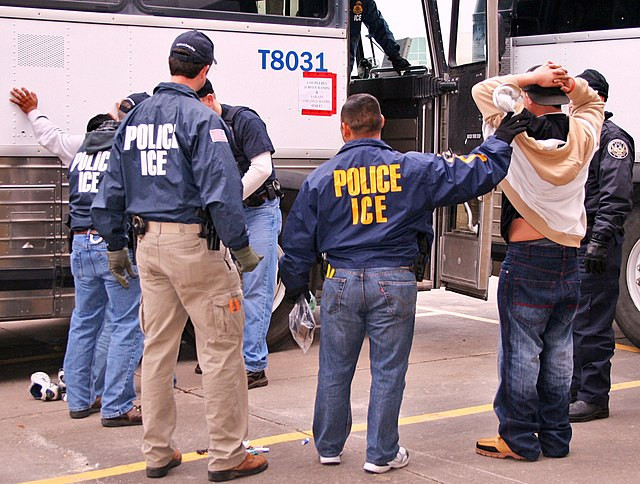Nearly 1,000 individuals were arrested during a weekend of sweeping immigration raids orchestrated by federal agencies under the Trump administration, sparking a wave of fear and uncertainty across immigrant communities nationwide. The high-profile operations were carried out with assistance from agencies such as the FBI, DEA, and ATF, signaling an aggressive expansion of immigration enforcement measures.
The raids took place in major cities, including Chicago, Los Angeles, Austin, and Atlanta, as well as Puerto Rico and the U.S. Virgin Islands, and were part of a broader crackdown aimed at what U.S. Immigration and Customs Enforcement (ICE) referred to as "potentially dangerous criminal aliens." According to ICE, a total of 956 arrests were made on Sunday alone, with an additional 286 reported on Saturday.
Homeland Security and ICE prominently showcased agents in tactical gear during the operations, releasing images and videos on social media. The visibility was deliberate, according to sources familiar with the planning, with agents instructed to wear raid jackets clearly identifying their agencies in anticipation of media coverage.
This is "a critical mission to take back our communities," Acting Deputy Attorney General Emil Bove said in Chicago, emphasizing the administration's commitment to prioritizing public safety. He added, "We will use all available tools to address obstruction and other unlawful impediments to our efforts to protect the homeland."
The raids also targeted individuals deemed "out of status," including those who had initially entered the U.S. legally but violated visa or immigration requirements. Sources familiar with the operations noted that law enforcement agencies were instructed to consider deportation for undocumented suspects if criminal charges were unlikely to materialize in the near future.
The operations have drawn both support and criticism. Illinois Governor JB Pritzker acknowledged the need to deport violent criminals but expressed concern about the broader scope of the raids. Pritzker said on CNN that what he finds "quite disturbing, is they're going after people who are law-abiding, who are holding down jobs, who have families here, who may have been here for a decade or two decades, and they're often our neighbors and our friends."
In Chicago, Mayor Brandon Johnson confirmed reports of ICE activity in the city but stated that local police were not involved, pointing residents to resources on understanding their rights. Chicago, a sanctuary city, adheres to policies preventing law enforcement from cooperating with federal deportation efforts, though it does not obstruct federal actions.
Immigration advocates reported widespread fear among immigrant communities. A Chicago-based nonprofit assisting immigrants described how adults avoided work and children stayed home from school to avoid potential encounters with federal agents. "Knowing their rights is empowering," said Brandon Lee, spokesperson for the Illinois Coalition for Immigrant and Refugee Rights.
In one incident in Tucker, Georgia, ICE agents detained an undocumented man during a church service, according to his pastor. While ICE agents did not enter the building, they asked for the man by name, prompting concerns about the psychological impact of such actions on communities.
Former ICE acting director Tom Homan defended the raids, emphasizing the need to prioritize public safety. "We're prioritizing criminal aliens, but there's going to be a point where we have to open the aperture to fugitives," Homan told CNN. He denied that ICE had quotas for arrests but reiterated his goal of targeting public safety and national security threats.
The focus of the raids also included criminal gangs like Tren de Aragua, a transnational organization originating in Venezuela. Federal law enforcement agencies have been directed to prioritize deporting suspects tied to such groups.
The operations coincide with a broader policy shift under the Trump administration to intensify immigration enforcement. Before taking office, Trump officials had inquired about the extent of investigations involving non-U.S. citizens, a source familiar with the transition said. ICE reported conducting 113,431 administrative arrests during the fiscal year ending October 2024, averaging 310 arrests per day.






